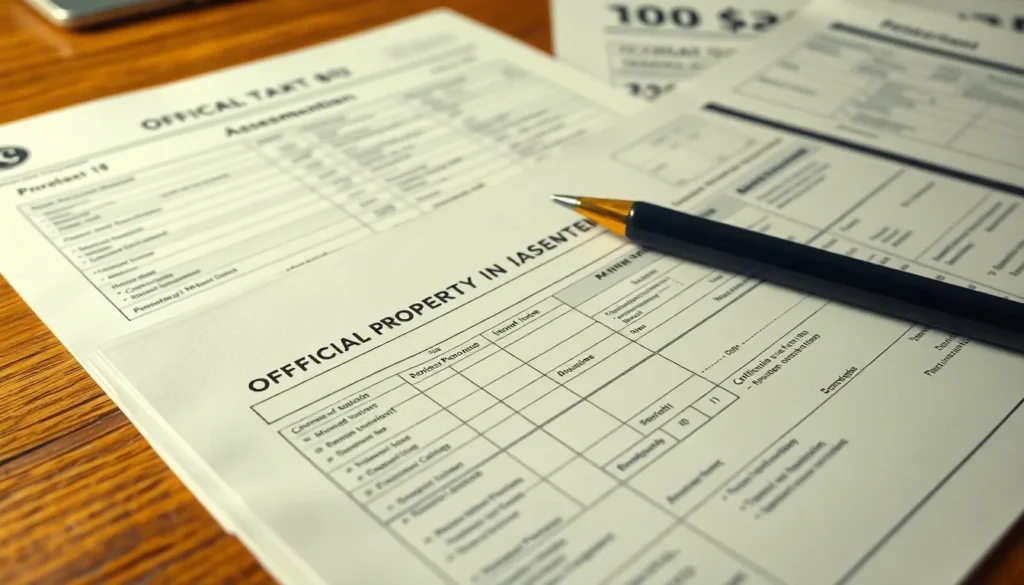Table of Contents
ToggleProperty tax records play a crucial role in the real estate landscape, serving as a vital resource for homeowners, buyers, and investors alike. These records provide essential information about property ownership, assessed values, and tax obligations, making them invaluable for informed decision-making.
Understanding property tax records can unveil trends in local real estate markets and reveal potential investment opportunities. They also empower homeowners to ensure they’re paying the correct amount of taxes and can help in disputes regarding property valuations. As property taxes can significantly impact financial planning, navigating these records effectively can lead to smarter investment strategies and better financial outcomes.
Understanding Property Tax Records
Property tax records contain vital information about individual properties, including ownership details, assessed values, and tax obligations. Grasping these records is essential for navigating the real estate landscape effectively.
Definition and Purpose
Property tax records are official documents maintained by local tax authorities. These records detail property ownership, assessed property value, tax rates, and payment status. They serve multiple purposes, including:
- Verification of Ownership: Establishing current property ownership to resolve disputes.
- Assessment of Value: Providing a basis for calculating property taxes based on assessed market value.
- Tax Obligation Records: Documenting past and current tax obligations for homeowners and buyers.
- Market Analysis: Aiding in the analysis of local real estate trends and valuations.
Importance of Maintaining Accurate Records
Accurate property tax records play a critical role in financial planning and legal compliance. The significance of maintaining these records includes:
- Financial Accuracy: Helping property owners understand their tax responsibilities and validate payments.
- Market Trends Insight: Allowing stakeholders to identify fluctuations in property values and local market trends.
- Dispute Resolution: Facilitating dispute resolution processes by providing clear historical data on assessments and payments.
- Future Planning: Aiding investors and homeowners in strategic planning based on accurate historical tax data.
Navigating property tax records effectively supports informed decision-making in real estate investments and home ownership.
Types of Property Tax Records

Property tax records consist of key documents that provide essential information regarding real estate tax obligations. The main types of these records include assessment records and payment records.
Assessment Records
Assessment records track the assessed value of properties as determined by local tax authorities. These records include details such as:
- Property Description: They contain vital information about property characteristics, including location, size, and land use.
- Assessed Value: Records outline the estimated value assigned to the property for tax purposes, influencing tax calculations.
- Owner Information: They identify property owners, showing current and past ownership details.
- Market Trends: Assessment records offer insights into local market conditions and trends, enabling investors and homeowners to analyze shifts.
Assessment records serve as a resource for understanding a property’s tax value and its influence on potential investments or sales.
Payment Records
Payment records document the history of property tax payments made by owners. These records encompass:
- Payment History: They detail all tax payments made, including dates, amounts, and payment methods.
- Outstanding Balances: Records indicate any past due amounts or penalties associated with unpaid taxes.
- Tax Year: They specify the years for which taxes were paid, along with relevant assessment periods.
- Refund Information: Payment records can provide insights into any refunds received for overpayment situations.
Payment records help property owners verify their payment status, maintain accurate accounting, and ensure compliance with local tax laws.
How to Access Property Tax Records
Accessing property tax records requires navigating through various resources. Homeowners, buyers, and investors can utilize both online platforms and local government offices.
Online Resources
Online resources provide a convenient way to access property tax records. Most county tax assessor websites offer searchable databases where users can find information by entering property addresses or owner names. These databases typically include assessed values, tax rates, and payment history. Government websites may also feature downloadable forms for property tax appeals or inquiries. Websites like Zillow and Realtor.com sometimes aggregate property tax information, offering users additional insights into local market trends.
Local Government Offices
Local government offices serve as authoritative sources for property tax records. Individuals can visit the county tax assessor’s office in person to request records and obtain certified copies. Staff members can assist with specific queries regarding property assessments or tax obligations. Additionally, local recorders of deeds often maintain property tax records, making them another resource for verification and documentation. Always bring identification and relevant property information to expedite the process at these offices.
Analyzing Property Tax Records
Analyzing property tax records delivers insights into property ownership, assessed values, and historical payment data. This analysis aids in informed decision-making and identifies trends within the local real estate market.
What Information Can Be Found
Property tax records encompass critical details, including:
- Ownership: Name and contact information of property owners.
- Assessed Values: Valuation data that reflects the property’s worth for tax purposes.
- Tax Rates: Applicable tax rates determined by local governments.
- Payment History: Records of past tax payments, capturing amounts paid and timelines.
- Outstanding Balances: Information on unpaid taxes and potential liens on the property.
- Property Descriptions: Details outlining property characteristics, such as square footage and zoning classifications.
This information proves valuable for homeowners verifying their assessments and for investors conducting market research.
How to Interpret the Data
Interpreting property tax data requires attention to key components, including:
- Assessed Value Trends: An upward trend in assessed values may indicate property appreciation, while a downward trend can signify a declining market.
- Comparative Analysis: Comparing assessed values against similar properties in the area provides context for property valuation.
- Payment Consistency: Evaluating payment histories reveals the owner’s reliability and potential financial issues that may affect property investment.
- Tax Rate Impact: Analyzing how local tax rates fluctuate over time aids in forecasting future tax liabilities.
Understanding these aspects enhances strategic decision-making in real estate transactions and investment planning.
Property tax records serve as an essential tool for anyone involved in real estate. They not only provide vital information about ownership and assessed values but also play a key role in financial planning and investment strategies. By understanding how to access and analyze these records, homeowners and investors can make informed decisions that align with their goals.
Navigating property tax records effectively can uncover valuable insights into local market trends and potential investment opportunities. As such, staying informed and utilizing these records can significantly enhance one’s position in the real estate landscape.







